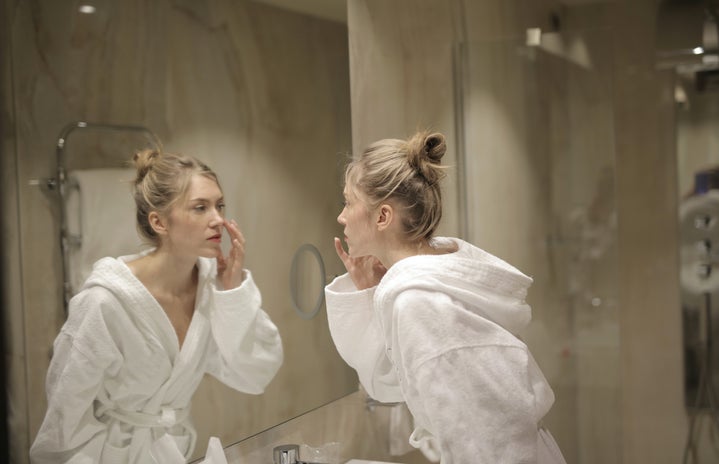Once again, Steph shares her top tips on skincare, this week tackling oily skin. Oils are produced by your body to keep your skin healthy, but when the oil builds up, it can lead to nasty flare-ups on the skin. However, Steph’s simply tricks can limit the amount of oil produced, allowing you to have fresh, and glowing skin.
What causes oily skin?
Before getting into these tips, it’s important to understand what causes oily skin. The oil on our skin is also known as sebum, which is produced in the hair follicles. In fact, our face has the most hair follicles per cm2, compared to the rest of our body. Despite how annoying the oil may appear; it plays a crucial part in limiting the amount of bacteria on your face and preventing dryness. However, this can sometimes get too much.
The amount of oil produced is heavily influenced by genetics, age and even the time of year. Often younger skin is more prone to sebum, so don’t worry! Although oily skin can be annoying, it usually means you won’t show signs of ageing for longer. Additionally, hot summers and humid days can also trigger your skin.
Eight tips to combat oily skin:
1)Wash your face regularly
Make sure to wash your face with water every morning and night, and especially after exercising! However, make sure not to scrub too hard as this can irritate your skin and make your pores look worse.
2) Use the correct cleanser for your skin type
Use a gentle cleanser. Many people assume that with oily skin, a strong cleanser is best to dry out the skin. But in fact, a harsh cleanser can irritate your skin and produce more oil. In particular, avoid oil-based products. This is because there is a fine line between cleansing your skin and stripping it with aggressive ingredients.
To avoid this, try looking for a cleanser that contains salicylic acid. This ingredient will penetrate through the skins oily surface and unclog pores with glycolic acid. This will gently exfoliate the skin’s top layer without irritating your skin. Also, creamy or milky cleansers will dissolve the dirt without disrupting the skin’s natural moisture level.
3) Blotting paper
Cosmetic blotting paper allows you to get rid of oil while not drying out your skin. They’re also convenient and easy to use on the go. Some blotting papers are lightly powdered to further reduce the shine.
4) Moisturiser
Many people with oily skin are often wary of moisturisers in fear of looking greasier. But moisturisers are vital to maintain the skin’s moisture levels and avoid dehydration. An oil-free moisturiser can keep the face moist without creating grease. In particular, it’s important to also avoid super thick and heavy, creamy moisturisers as your skin may struggle and lead to congestion.
5) Clay Masks
Clay masks are perfect for targeting oiliness, as they act like a sponge and soak up any excess oil. However, there is also a concern about overdoing it and drying out the skin. My top tip is to only use the face-mask on problem areas to eliminate this concern and only do this occasionally… maybe even limit them to significant events.
6) Don’t squeeze spots
Squeezing spots is never a good idea, no matter how tempted you are. Doing this can lead the congested pores open to bacteria, making your spot worse and causing more blemishes in the surrounding areas.
7) Stick to a routine
This is vital to ensure you’re actually receiving the benefits. It takes up to 30 days for the top layer of the skin to turnover, but some dermatologists even recommend using a product for at least 12 weeks. Although it’s a long process to trail these products, it’s definitely worth it! Also, start off with a short and simple routine such as cleanser, toner and moisturiser, that can quickly become second nature.
8) Talk to a dermatologist
If you’re still struggling to reduce the excess oil, contacting a dermatologist to give you professional help can supply you with further information.
Sources:
https://www.webmd.com/skin-problems-and-treatments/acne/features/oily-skin
https://www.elle.com/uk/beauty/skin/a37721/how-to-get-rid-oily-skin/
https://pfeffersal.com/about-us?awc=19918_1643824865_714d7d0c0011625259e1f0a94bea526c
https://www.healthline.com/health/oily-skin-causes#location-and-season
https://www.aad.org/public/everyday-care/skin-care-basics/dry/oily-skin

